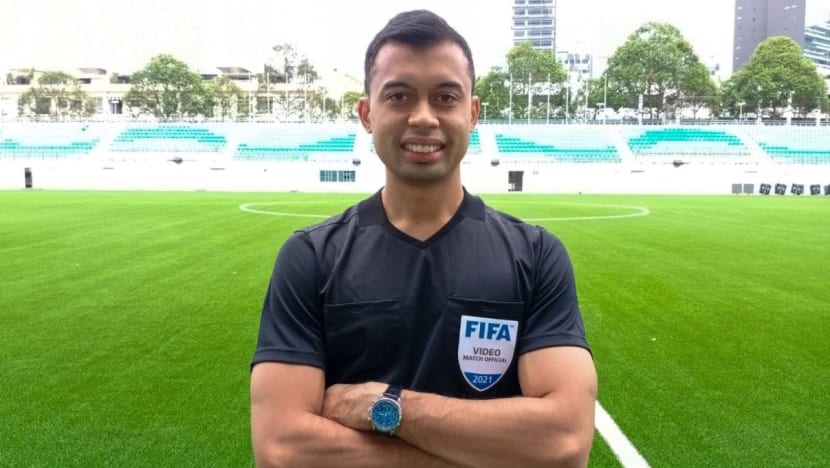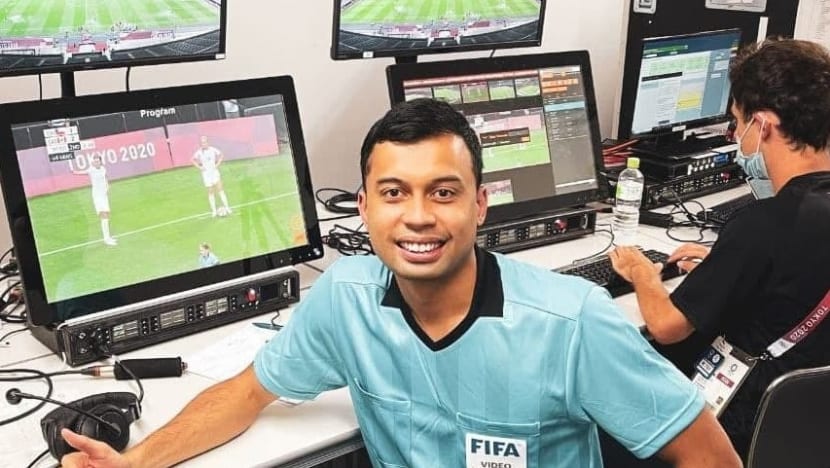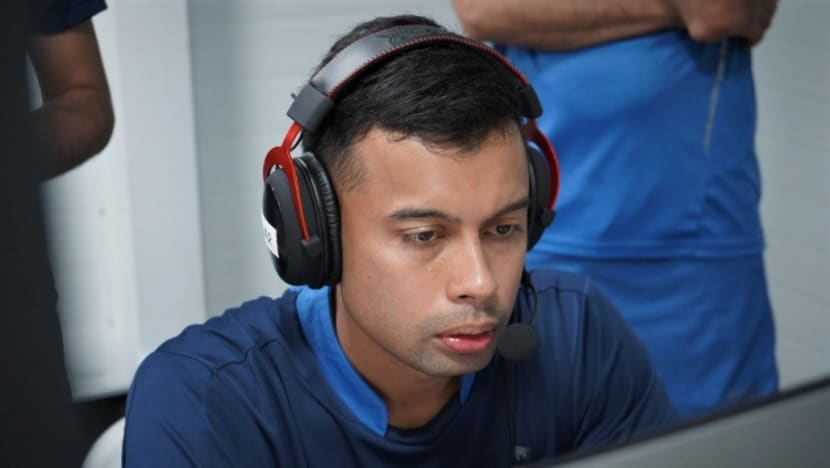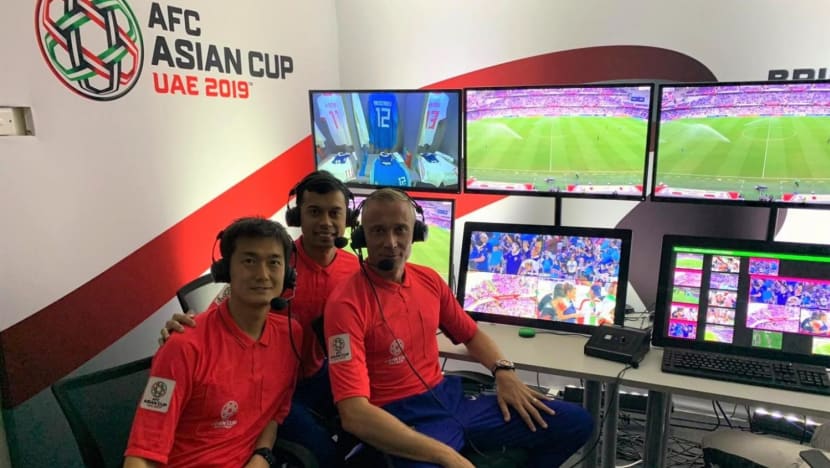Two decades after joining a refereeing course at 16, this Singaporean will officiate at the World Cup
CNA's Matthew Mohan speaks to Muhammad Taqi Aljaafari Jahari, the only Southeast Asian referee at World Cup 2022.

Singapore referee Muhammad Taqi Aljaafari Jahari will be a video assistant referee at World Cup 2022. (Photo: Muhammad Taqi Aljaafari Jahari)
SINGAPORE: A work meeting in May was interrupted to break the news to 36-year-old Muhammad Taqi Aljaafari Jahari.
He had been selected as one of the 129 match officials for World Cup 2022. And there were tears.
"It was very, very emotional. I was overjoyed with tears … Honestly, I didn't expect this appointment and coming from a country like Singapore, where we are from a tiny nation on the world map," he recalled.
"This is something that I really hoped for. I really worked hard for it ... Your role can be a referee, can be an assistant referee or can be a VAR referee or even can be a reserve referee. But every role that is being assigned in the World Cup, it reflects on the tremendous, hard work that you have done in the past years."
And for Taqi, who will be one of the 24 match officials operating the video assistant referee (VAR) system at the tournament, it was a journey which began when he was just 16.
FACING PRESSURE
As a youngster, Taqi honed his football skills at the void deck with friends but he eventually joined the hockey team as there was no football co-curricular activity offered in his school.
"Football was just a pastime for us, because we had an interest in football. And we just played football socially among my schoolmates," he said.
He would be eventually roped into one of the Football Association of Singapore's refereeing courses by two of his schoolmates, who had family members officiating matches in the local amateur leagues.
"When we were playing football, we would talk about football and so ... they roped me in just to learn the laws of the game," he said.
"When I took up the course, it was to know more about the game. There wasn't any like so-called deep interest into refereeing, just learning the laws of the game and officiating matches at the grassroots level, at the amateur levels."
But with more time on his hands after his O-Levels, Taqi decided to dedicate more time to refereeing.
He would eventually officiate his first match in the S.League (now Singapore Premier League) in 2006.
"At the age of 19 .. people like me would like to make your debut for your national team, or for the age group team as a football player," said Taqi.
"But for me making a debut as a referee itself, I think it put a lot of pressure on me ... because I was facing on the field of play very, very experienced players, whether local players or even international players."
As he officiated more matches, Taqi would overcome this.
"I felt that this was an opportunity for me to go forward ... to the next level, probably in the international level in the years to come. So that was where my passion developed, my interest for refereeing developed more and I decided to take the refereeing more seriously, rather than more like a pastime or leisure," he added.

LIMELIGHT ON THE PLAYERS
Fast forward to today, and the Singaporean now has a number of high-profile assignments under his belt.
Just last year, he was one of the video match officials at the Tokyo Olympics men's football final between Brazil and Spain. His refereeing career has also taken him to the AFC Asian Cup, and the FIFA U-20 World Cup.
But whenever the assignment, whatever the assignment, Taqi has one motto - that the focus be on the players and not the referee.
"My principle in every game that I do, whether in a local match or whether in an international match, is to always remind myself that the limelight will always be on the players, on the teams, because they are the stars of the game," he added.
Just like players or coaches, referees do make mistakes, Taqi pointed out.
"Mistakes do happen in the game. Like how the players in the game make mistakes, for example - they may miss an open goal. Like how the mistakes of the coaches - they may set the wrong tactics for a particular game. These are all part of the game that happens," he added.
"But the tough part I will say that as a referee is that when a mistake occurs, it becomes like a big headline ... As referees, we understand that mistakes do happen, and no referees would like to come into the field of play making mistakes."
World Cup 2022 will be only the second time that the VAR will be used at the tournament.
But the system has faced scrutiny in the footballing world, especially in the English Premier League.
While Taqi acknowledged that VAR does momentarily disrupt the game, he stressed that the ideal goal is minimum interference by the VAR, but maximum benefit for the game.
He noted that the VAR's role is to assist the referee on the field of play specifically in four match-changing situations.

These situations are mistaken identity, direct red card incidents, penalty decisions and offences leading up to a penalty decision and goals as well as offences leading up to a goal.
"We have to remember this knowledge of the VAR protocol while at the same time, we need to process our thoughts on the game itself within the split second - whether these situations fall into this category," he said. "And if it falls (into these categories), then that's where the VAR will do further checks to see whether there's a possibility to call the referee or not."
Throughout a match, the VAR team constantly checks for clear and obvious errors related to these situations.
In addition to understanding the technical laws of the game and VAR protocol, VAR referees also need to know the camera set-up for matches, said Taqi.
"It is important for the VAR (referees) to understand and to know how many cameras are there before every game in the stadium and to understand where the location of the camera is," he said.
"With this, you will save time in the checks ... (this) means that you are saving the delay of time on the field as well."
One of the misunderstandings people have is that VAR makes the final decision all the time, said Taqi. But this is incorrect.
When it comes to "factual decisions" such as whether the ball has crossed the goal-line, VAR aided by goal-line technology will step in.
However, in other cases, the referee makes the final call.
"Most of the decisions on the field of play are always subjective. And this is where the referee on the field of play will have the final decision," Taqi said.
HEADING TO QATAR
Assignments for the tournament will only be announced closer to the matches, said Taqi, who spoke to CNA before he jetted off to Qatar in early November.
Prior to the tournament, referees undergo about 10 days of physical, technical and theoretical training.
As part of theoretical training, referees analyse videos of past matches and past "situations" for the teams that are playing in the World Cup, said Taqi.
"We will be working with local players in Qatar. For our practical session, we have the VAR system in place. So we will have a lot of practice during these 10 days for the referee as well as the VAR in the preparation towards the opening game," he added.
Taqi's time in Qatar will take him away from his family and this is one of the sacrifices which are part and parcel of a referee's journey, he added.
The travelling means that he has missed key milestones and personal time with his children along the way.
"Of course they are very proud that all the sacrifices that I've made thus far, whether personally or whether it's as a family, have borne fruit, and this is something that I've looked forward to in my refereeing career," he said.
"But on the other hand, means that, yes, I've been sacrificing a lot of time away from them. Not only in the upcoming World Cup, but in the build-up to the World Cup ... With the past two years, we have been in a pandemic state where matches are usually played in centralised venues and (I have been) coming back with quarantine (restrictions) and so on so forth. So it has been tough as well."
Taqi is also looking forward to meeting up with match officials from around the world during his time in Qatar.
"I have the chance to meet the best officials around the world who have been selected ... The chance to work with them, the chance to understand how they officiate. Coming from the different levels of their leagues, as well as different confederations coming together in one country to ultimately make consistent decisions, irrespective of where you are or where you come from," he explained.

Ultimately, Taqi hopes that his time in Qatar will pave the way for more local referees.
He will be the fifth Singaporean to officiate at the World Cup, said football's governing body FIFA.
"I hope this will not be the last representation from Singapore to be at this world stage and I hope in the future, we will have younger referees or maybe someone else who can even do more than myself."
Watch all 64 matches of the FIFA World Cup Qatar 2022™ LIVE on meWATCH. Visit mewatch.sg/fifaworldcup for details.

















